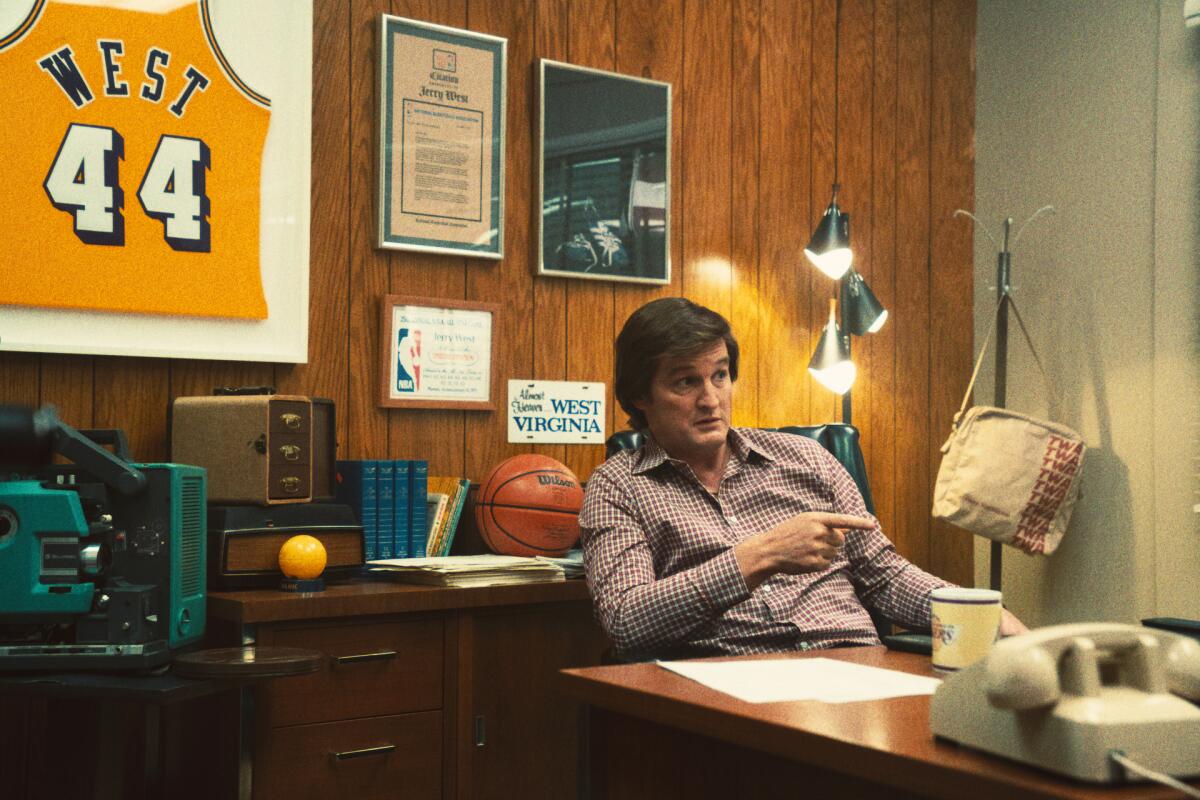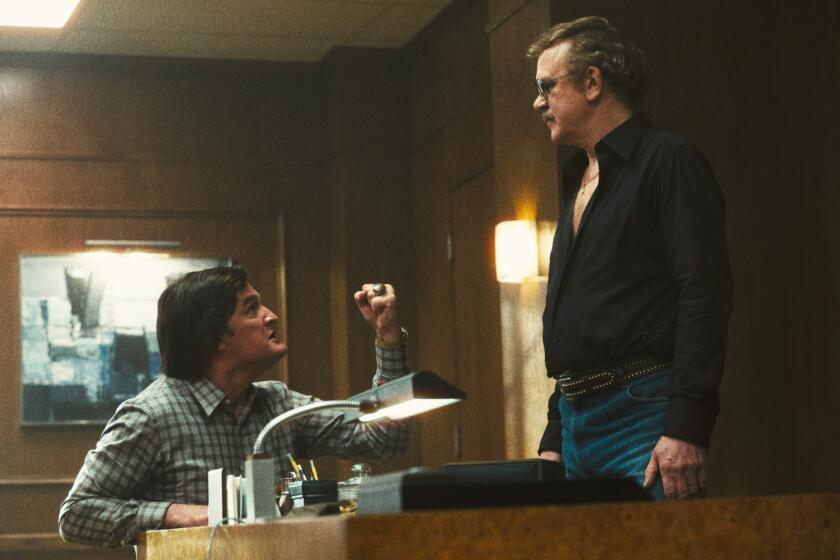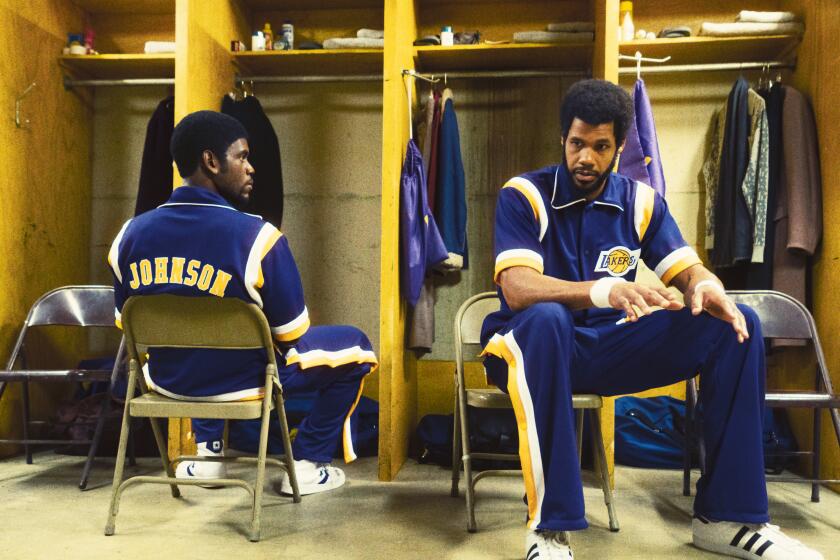Jason Clarke’s controversial Jerry West aims for truth: ‘He’s notorious’

- Share via
“Winning Time,” HBO’s drama about the saga of the Showtime-era Lakers, has largely flown under the radar since its premiere in March, buffeted by a crowded TV landscape, an Oscar-night scandal that upended Hollywood and an ever-relentless political news cycle. If you’ve been wondering what would make the series break out, the past week provided an answer:
Upset by his depiction as volatile and troubled in “Winning Time,” the former Lakers player, coach and general manager has demanded a retraction from HBO and threatened a legal case stretching all the way to the Supreme Court, raising questions about where “based on a true story” crosses the line into fiction or even “character assassination.” (HBO this week defended the portrayal, citing “extensive factual research and reliable sourcing” behind West’s appearance in the show.) So far, though, nearly all of the commentary on the fictionalized West has come from the real West, his attorney and other Lakers condemning the show — not from those who made it.
In March, in an interview for an episode of our “Binge Sesh” podcast on the Laker coaches we meet in Season 1 of “Winning Time,” Australian actor Jason Clarke, who plays West, described his love for the Laker great, his research for the role and how he got himself riled up for his most intense scenes. (Through a representative, Clarke declined to comment Wednesday on the controversy around the portrayal.)
This interview has been edited for length and clarity.
Everything you need to know about the fight over “Winning Time: The Rise of the Lakers Dynasty,” all in one place.
Tell us a little bit about what struck you about his autobiography [“West by West: My Charmed, Tormented Life”]. Was there anything that surprised you or stood out as, “Oh, this detail really crystallized the character”?
Jason Clarke: Well, yeah, that was the first place I started. I had looked at some pictures first, and then I went and I read it. And I listened to it after that on Audible because his son Ryan reads it and Jerry introduces it.
I was really struck by the way he introduces the book and he talks about this being an examination of, you know, my charmed and tortured life and how I got to be who I am, and why I am, and why for many, many years he took the being unhappy and depressed and angry and frustrated and a need to understand that as he went along in life, as still a basketball person as well as a father and a husband and a brother and everything that went with it.
He struck me as a man really continuing a path of self-searching, which I really enjoyed. I’d never read a biography quite like it.
Based on the research that you’ve done, what do you think made Jerry West hate coaching the way that he did? Or what about coaching sort of drove him crazy?
Jason Clarke: I love the place where the pilot starts this story with Jerry and love it as amalgamation. But it’s a man struggling to come to terms with the ball and what that ball is for him — that ball being basketball — what it’s done for him as a child, what it’s done for him as a little boy in West Virginia and his father and his brother.
When we meet him, it’s not making him happy. He talked about it in his book: He’s not a nice man. He’s very hard. He’d been through all those years of getting beaten by [Boston Celtics player] Bill Russell. And it’s not that he hates his job. He cares. I mean, he talks about it in his book, that he cares so much it hurts.
He doesn’t like when other people don’t care, but that’s a very judgmental thing to say about who cares and how you care. Jerry’s driving himself mental, I think, at that point with his own compulsive, obsessive competitiveness. And so to be an ex-player who played so high, got so close and only won one ring — and his main man, [Lakers teammate] Elgin Baylor, wasn’t there when he won it. And he didn’t beat Bill Russell. So there was a lot of baggage, even, that came with the win.
And so now he’s gone into coaching and he’s Mr. Laker at this point, but yet I got the feeling that Jerry hadn’t put his head up for air as a human being. I think he’s just run into a wall where we find him at the beginning, having an existential crisis about finding out who I am in relationship to this ball, what it’s given me and now what it seems to be doing to me, tormenting me almost, even though I think I love it so much.
He goes on to find himself again, and that’s another thing that I like. In his book, he talks about his love of art and his love of wine or clothes and colors. And he’s on a path to try and discover himself because since a young age, all he had was the ball. And it gave him everything and it took him away from the pain that he was causing. It gave him discipline but it also beat him up.
Those losses to Bill Russell — I kind of likened it to boxing, the way he describes it. And if you box, it’s like that last 30 seconds in the championship round, it really hurts. You’re just taking it and taking it.
When I looked at those pictures of Jerry and those losses, in any footage I could get, it came down to those last bits of time and it just brutalized him. So it’s not like he’s good or bad. He just doesn’t know how to relate anymore.
Everything you need to know about the true story of the Showtime Lakers, all in one place.
How would you describe how Jack McKinney, who succeeded him as Lakers head coach in 1979, won Jerry over?
Jason Clarke: His dedication to the game. Jerry loves it. He just loves it. He just saw someone that was dedicating himself, that cared as much as Jerry cared. That’s what I think he was.
And also that he’s looking for a different way to play the game.
I think the other thing would be that he wasn’t a player. And it really starts to occur to Jerry at that point through Jack McKinney, like, just because you’re a great player doesn’t mean you’re a great coach. In a subconscious way, but in our script and our story, is that beginning of Jerry being able to let go. Somebody else here can talk the game and understand the game in a way that I appreciate and understand on a level that strikes me.
How did you prepare for scenes where you have to get so riled up?
Jason Clarke: First of all, I’ve got to make sure where my director wants it pitched. My first scene in the part was the golf course scene, and I really thought, instead of over-discussing this with Adam [McKay], I’m just going to put this way out there and go for it and see what happens.
And you can tell pretty much instantaneously, not just from the director but from the crew as well as the other actors, whether this is the level it should be at, and I kick it off pretty big, I mean, I took off half the f—ing green with my foot. I just went big.
In terms of really kicking off strong, everyone’s got a Jerry West story in L.A. Before people knew that I was playing him, I could have conversations about what’s going on. And I heard a lot of stories about, he’s just always got an inner monologue going. So I would talk myself into a f—ing frenzy.
I’d start talking, just working it up and having this dialogue with myself, because at this point Jerry is like, he’s a ship that just can’t unmoor himself to go out to the place where he was going to be able to change. And so he’s tugging at his own mooring, he’s trying to hold on, everything’s f—ing doing his head in. He can’t even enjoy his golf.
And it becomes actually quite freeing rather than working up to it, just hitting it.
And then there’s just tips along the way here, little snippets of him off-mic or something, swearing. He’s been in front of the camera and he’s the main guy since high school. This Cary Grant kind of figure, he’s tall, he’s athletic, he carries himself like a leading man and an athlete. poised But he’s got this other side to him that you just hear from people.
And that’s where I started. If it was written as, “S—,” I’d add, I don’t know, a “s—, f—.” And then you’d see people reacting. The first day after COVID we all got back together was Episode 2, and it was a big scene around the table: “Stop pissing on a flat rock and tell me that it’s f—ing raining.” I thought, “You know what? I’ll throw the swearing in there this time. I’ll wait till I get the tap on the shoulder where it’s just like, ‘Put it down a bit.’” But it never came.
And then there’s some other guys that I never really paid attention to in the makeup trailer that day that were getting wigs and mustaches on and one of them comes up while we’re shooting and says, “Dude, I worked with Jerry West for 30 years, man. You’re doing a f— great job. We used to call him Jerry F— West, because he swore so much.”
Do we want to take it to 11 or maybe just 10½? I was very relieved when we weren’t going to go for a 9.
[Former Lakers player] Rick Fox [who consulted on “Winning Time”] said, “Jerry’s always talking to me. Whatever’s going on, he’s got a monologue going on about what the f—’s happening.
One of the most oft-cited details about Jerry is, he couldn’t watch the game. So he had to be pacing in the corridors. He had to be driving around L.A. There’s a scene in “Winning Time” where he’s sitting in the back of a limo driven by a Celtics fan. Trying to imagine a guy whose brain is doing what you just described but having to channel it all inward instead of outward, he would be ready to explode.
Jason Clarke:
It’s just part of the folklore of Jerry. He is the way he is. He was superstitious. He had to drive the same way to work. It didn’t matter if there was a traffic jam, he had to go the same way, rain, hail or shine.
It’s funny, there was a basketball guy in Brazil we did an interview for, and he said, “Man, basketball. So this ball saves lives.” It really touched me because that’s what Jerry talked about, you know, back in West Virginia, back in the day, that brown piece of rubber saved his life.
You can get that. It’s a charmed, tormented connection to the way you are and to winning and losing. And then you throw the competitiveness in there and, you know, as professional athletes, I can’t imagine.’’Cause you just can’t stop competing. You live for the compete. You live for that couple of seconds where it’s on the line and you want to be the man, Mr. Clutch.
I used to get around calling myself Mr. Clutch all the time. “Come on, Clutch, come on.” Just ways of reminding yourself and trying to find the character, to not be scared, to just to put it out there, because I think all these characters are extraordinary characters.
I didn’t want to be the scared Jerry, you know, or the safe Jerry.
What’s your basketball? What’s your thing that you love so much, it drives you a little nuts?
Jason Clarke: Actors are compulsive obsessives. We just go from one compulsion to the next. Each job has been a compulsion, to the point where I’ve had to chill out because you become — it’s like when I did “Everest,” really got into mountain climbing. I found myself in some mountains I shouldn’t have been on ’cause throwing yourself into it is part of the joy. The idea that you can not be one thing, but you can have many lives in a short little lifespan that you’ve got. Go here, go there. Now I’m Jerry West. Now I’m doing this. Then I’m off to that. You know, next I’m doing “Oppenheimer,” and you just immerse yourselves into these worlds.
You’ve got to be careful with compulsive obsession, you really do. When I was younger as an actor, I lost some jobs I loved so much they hurt. I remember just playing video games, just like when you become obsessed with something because you just want to take your mind out of what’s going on and where you are and just shut it all down until your body kind of resets itself inside. But you can’t turn it off because it is what you’re paid to do. It’s your vocation payment to do it, “now I need to get obsessed about this.” So you get a very close, you know, relationship with it. Just don’t pay too big a price.
Can you tell us your favorite Jerry West story that you’ve heard? One that really stuck with you?
Jason Clarke: He’s notorious. Yeah, there was one. When we were shooting — he was at the Clippers [game] or whatever. And one of the actors in that show walked up and said, “Hey, Mr. West, I’m, you know, I’m doing this scene.” And he just said, “F—ing run along. I won’t be watching that piece of s—. Get going.” You don’t just roll up on Jerry and expect — you know, and fair enough.
Everybody’s got a Jerry story. The one thing I did notice was that he’s well loved. There’s just something about that cranky, hard to get to know, but he’s also loyal and endearing, and he stays with you. He treats you with respect if you treat him with respect, I guess.
Let’s say that you do get a chance to sit down with him. What do you hope to ask him or get out of that conversation?
Jason Clarke: Nothing. I’ve played a few real people before and you never really want the facts and figures. The facts and figures are there, and they’re whatever. But there’s just something about the energy of the person, the pace they tick out that you just feel.
I’m a great admirer of the man becoming Jerry West. He was not born the Jerry West that we know. He’s become it and he’s still becoming it, and he’s moving, and he’s still even growing within basketball and the game and he’s still attached to it where a lot of people just aren’t anymore. He’s still a student of the game as well as one of the great minds of the game, even at this age.
As we all find some success in life, we’re able to express ourselves in the way that maybe we couldn’t before and we didn’t have many opportunities or choices. I know that with my own self, it’s just like, when you got nothing, you gotta go with the cards you’ve got. You grow into what you want to be as well as what you hope to be. That’s really struck me about him. And that he’s not afraid to call it as he sees it. And putting it on the line. He was always a man that just put it on the line.
Both the character as you play him and also Jerry West, the real person — he is a connection to a former world of sporting figures that has been kind of corporatized out of existence.
Jason Clarke: Totally. It’s funny, in a lot of this stuff, he very rarely talks about money. It never really comes up. In a lot of the interviews I’d listen to him, “The Dan Patrick Show” and different things, money’s not really there for him. It’s never been the main thing.
And I also love hearing him talk about Elgin Baylor. I mean, those guys started the Lakers. When you go back into how the Lakers came about, I mean, Los Angeles was just a dirt ball, so were the Lakers. They were nothing. He couldn’t get anybody to come out and even watch them. They were like this team out West where nobody was. And he’s been there through all those times from the ’50s to the ’60s to the ’70s, crazy days.
When he first signed Shaq, he went to hospital for two weeks at the end of that, he was so exhausted and drained. They hospitalized him. You cannot say that Jerry West does not understand what the game has given him, what that ball has given him, and has not been grateful for it ever since.
The game has changed. You’re not going to see Jerry Buss — it’s billionaires and hedge funds. You know, the next thing in America will be countries buying a basketball team or hedge funds, a group buying a basketball team. Where else do you go when it gets that big and that much money? It’s hard being a fan now.
That’s another reason why it’s nice to go back there and to remember that it wasn’t always like that.
Is there anything that we didn’t ask you about Jerry that you wish we had?
Jason Clarke: If I speak to him, I’ll come back to you. It’s interesting, you know, Jerry exists outside this world in a way, but he’s where they’re all heading. Where do you go after the game?
Where does that go ?when you’re not at that 100% competing? ’Cause that’s another adrenaline. It’s like somebody’s doing a scene. It’s action. It’s f— on . For that 1½ minutes, that’s when you’re living and dying.
He’s gone on to find his way, more than any player I think, to stay involved. And to stay relevant.
He’s still so quotable. He’ll talk about the Lakers now and make news if someone asks him for just a sort of stray thought.
Jason Clarke: He gives it, doesn’t he?
I was at the game the other night. You know what I see? I see the players hugging each other on the opposite teams before the game. I’m saying, “F—, Jerry hates that, man.” Hates it when players on opposite teams walk up and give each other — it’s, “Dude, you’re at war. What the f—?” Excuse my language.
It’s just, you start to get my mindset. You know, it had really gone there, I think, because he was so much fun to play. I love hearing that people relate to him because it means that’s come across. I didn’t want to be angry. I just wanted to care. Know what I mean? I cared about everything to the point where it was just like, “F— that, f— this, and f— you.” You know what I mean? “Stop pissing on a f—ing flat rock, Bill, and telling me it’s raining.”
It was a ball. I have very fond memories of it, and I’d love to go back and revisit the man and play it again.
If I do sit down with him, I don’t really want to talk about it. I just want to have a glass of wine with him.
More to Read
The complete guide to home viewing
Get Screen Gab for everything about the TV shows and streaming movies everyone’s talking about.
You may occasionally receive promotional content from the Los Angeles Times.









